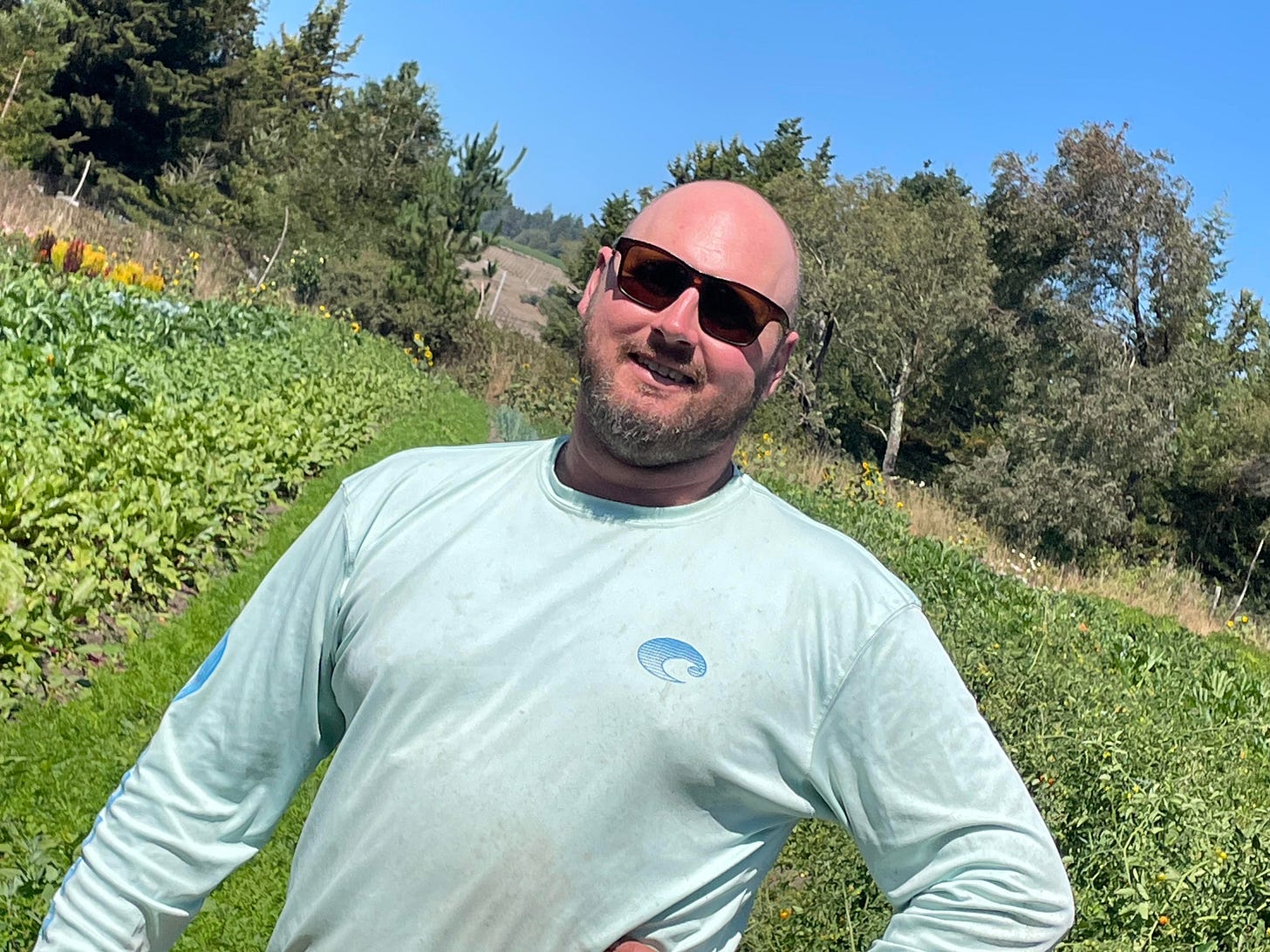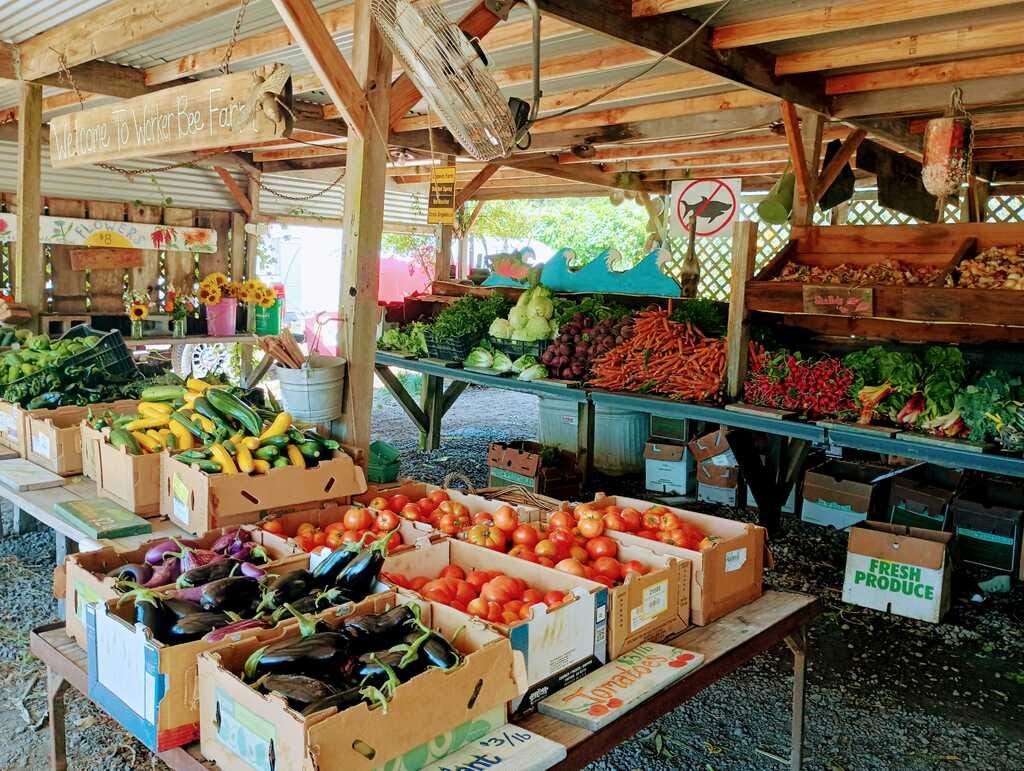Community helps local farmer who’s determined to pay it forward
Reports of theft at a beloved local farm stand brought a huge community response and a GoFundMe
Will Scott, the owner of Worker Bee Farm, has been farming most of his adult life. For the last 11 years, he’s worked a few acres off Bodega Highway just outside of Freestone, growing a huge array of organic vegetables, fruits and flowers.
And for all of those years, the farm has had a farm stand — a big three-sided shed with baskets and boxes of gorgeous looking vegetables, fruits and bouquets of flowers.
The Worker Bee farm stand is a surprisingly busy place. It’s a popular spot for locals and for people travelling to the Sonoma Coast from the Bay Area. It sees a steady stream of customers all day, weekdays and weekends, which are especially busy.
Scott enjoys growing food for his community. It’s not very remunerative – the farm made around $16,000 last year after expenses, he said—but he likes farming and working in a beautiful place, and during the off-season he makes money through other means—crabbing or carpentry.
His farm stand is a community institution for a lot of folks in Freestone.
“People ask why I don’t have a vegetable garden,” said Eric Koenigshofer, who lives on 10-acre property near the farm. “And I tell them, I do – it’s right up the street and Will is my gardener.”
Worker Bee Farm’s farm stand operates on the honor system. There’s no clerk to weigh your vegetables and take your money. You do that yourself and drop your money in a locked box.
And for years, that worked just fine.
Until this year, when the money he was bringing in from the farm stand mysteriously dropped by around 15%, despite the fact that he was growing more food.
“This is how I know something's off,” Scott said. “Sales have always gone up every year, and this year, I've added another three acres, so we've doubled our production, which doubled my rent, doubled the soil amendments, and doubled employee costs. There's twice as much space to farm, and every year I’m getting better at doing my job. All the food’s disappearing from the farm stand—I'm not throwing any of it away--but my sales have dropped by like 15%. They should be up by like 25%.”
Scott said that theft from farm stands is a common problem, but that this sudden spike in people simply taking produce without paying – or paying for some but not for everything – is simply too much.
He’s not quite sure what to do about it. He doesn’t want to bring in cameras—“I don’t want to spoil the environment,” he said. It doesn’t make sense to hire someone to work in the farmstand, which is open from dawn to dusk. That would probably cost close to what he’s currently losing to theft. He thought of putting up a sign asking people not to steal—and even had one made, but then decided not to put it up. He doesn’t want to spoil the sweet, convivial atmosphere of the farmstand.
If the problem doesn’t fix itself—in other words, if profits don’t start going up soon—he said he’ll consider closing the farm stand, which takes a lot of work to stock. He won’t stop farming; he would just try to sell his produce to a wholesaler, who will likely pay him 25% less for his produce than he sells it for at the farmstand.
“I'm okay with making less money,” he said. “I'm not okay with getting taken advantage of.”
Scott doesn’t want to close the farm stand. He hopes it won’t come to that and so do his customers.
“Having a family farm where we can all stop in and get beautiful produce and flowers — that's part of why we all love living here,” said Penelope Winett, a regular customer who says her family gets about 80% of their groceries from the farm stand during the summer.
Winett posted about Scott’s dilemma on Nextdoor. Scott hasn’t read her post—he’s not very comfortable about going public with this problem—but he hopes that the post on Nextdoor and perhaps this article, can alert people to the problem and remind them how important it is to pay for everything they pick up at the farm stand.
Regarding the possibility of the farm stand closing, Winett wrote on Nextdoor, “This completely breaks my heart, and it’s such a sign of the times. Please, community, do the right thing and pay fully for whatever you are buying through the honor system.”
Winett suggested that people pay a little more, just to ensure that the farm stand stays open and to make up for the miscreants that don’t pay.
“I think it's so important for us to hold on to our small family businesses and especially our sustainable agriculture and small family farms,” she told the Sebastopol Times.
Winett said she was overwhelmed by the response she got from her post on Nextdoor. She was so encouraged by the outpouring of love and suggestions from folks in the local community that she decided to start a GoFundMe for Worker Bee Farm.
She did this without telling Will Scott. She wanted it to be a surprise – a gesture of the love and appreciation of his community.
“The response from the community was just over the top, everyone saying ‘What can we do?’, and I was like, I'm gonna just start a GoFundMe. (It's easier to ask forgiveness than permission). And the response has been amazing. We've gotten over $1,000 in donations.” (It’s now over $1,700.)
She hopes to raise $7,000 for Worker Bee Farm.
“The community response just blew my mind. It actually brought tears to my eyes and like, ‘Damn, I love our community, and this is how we roll here,’” she said.
For his part, Scott is a little embarrassed by all the fuss, but he’s decided to put this unasked-for windfall to good use.
In his twenties, he taught sustainable farming in Ethiopia through an organization called Common River. He’s always wanted to go back there to teach again, but hasn’t been able to afford the trip. Now he’s hoping to use the GoFundMe money to finance a trip to Ethiopia, where he’ll teach sustainable farming for three months. His hope is to raise enough money to do this by next year.
“What I want to do is to switch it up: you know, the farm is fine, I'm fine; everything's fine,” he said, but he knows there are places in the world – Ethiopia among them – where that is not the case.
This way, he said “The money will go to help people who really need the help.”



